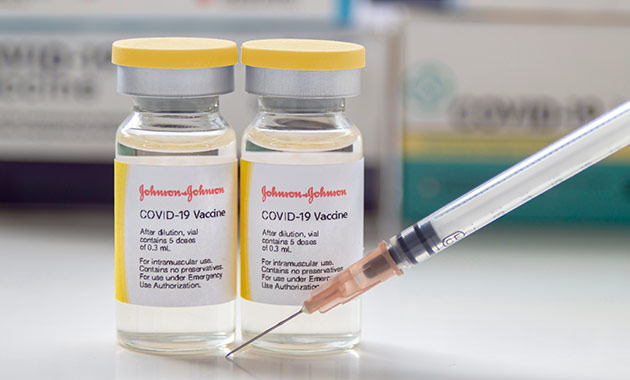
The mutation of COVID-19 virus into different variants has become the most pressing matter in recent times. And, vaccination is the only way to ensure safety against these unpredictable mutants. Getting vaccinated not just reduces the risk of getting infected with COVID-19, it brings a significant drop in the risk of getting severe COVID-19 disease.
India has vaccinated over 53 crores [1] people with at least one dose since January 2021. As of date, Indian authorities have given emergency use authorization to 5 COVID-19 vaccines: Covishield, Covaxin, Sputnik, Moderna, and now Johnson’s & Johnson’s Janssen.
Here we answer some of the most commonly asked questions about the newly authorized J&J’s single-dose COVID-19 vaccine.
Q. How does the J&J’s single-dose COVID-19 vaccine work?
J&J’s vaccine is a carrier or a viral vector vaccine. It is created by using a harmless, inactive, non-replicating adenovirus, which in its active form causes common colds. This adenovirus acts as the vector. The genetic code (RNA) of the SARS-CoV-2 virus’ spike protein is inserted into this adenovirus vector. Spike protein refers to the spikes present on the outer layer of the SARS-CoV-2 virus that attach to the human cells on infection.
On getting vaccinated, this vector enters your cells and instructs them to make spike proteins. Your immune system notices these spike proteins and evokes an immune response. Once your immune system fights the prospective threat, it creates memory cells. These memory cells remember how to fight the spike protein of SARS-CoV-2. As a result, your body is now prepared to identify and fight off SARS-CoV-2 virus if it ever enters your body [2].
The adenovirus and the SARS-CoV-2’s genetic material cannot cause any infection as neither of them can replicate. This mock, harmless vector silently trains your body to fight a war against the real villain – the coronavirus.
Q. How is the Janssen vaccine different from the already available COVID-19 vaccines?
The Johnson & Johnson’s Janssen vaccine is a viral vector vaccine – similar to the Serum Institute’s (SII) Covishield vaccine. The difference between the J&J and the SII vaccine is that while Janssen is made using a human adenovirus, or a cold virus, Covishield is made using a chimpanzee version. The J&J vaccine can be stored in a regular refrigerator, making supply and storage an easy task to deal with. However, unlike many other COVID-19 vaccines, the J&J vaccine is a single-shot vaccine. You are considered fully vaccinated after 2 weeks of getting its dose.
Q. What is the efficacy of the J&J’s single-dose COVID-19 vaccine?
It was seen that the J&J vaccine had an efficacy of 85.4% [3] against severe disease and 93.1% [3] against hospitalization after 28 days of vaccination.
However, in clinical trials, the single-dose vaccine had an efficacy of 66.9% [3] against symptomatic moderate and severe SARS-CoV-2 infection.
Q. Is J&J’s single-dose vaccine better than the two-dose vaccines in use?
We cannot compare the vaccines head-to-head due to the different approaches taken in designing the respective studies. However, all the vaccines approved for use against COVID-19 effectively prevent severe disease and hospitalization due to COVID-19. The efficacy data shows that all the vaccines available for COVID-19 are effective in preventing severe disease and death. And, that is exactly what one should expect from a vaccine – protection against severity. No vaccine provides 100% protection.
Q. Is the J&J’s single-dose COVID-19 vaccine effective against the Delta variant of SARS-CoV-2 virus?
Yes, as per Johnsons & Johnsons’ July report, their COVID-19 vaccine is effective against the Delta variant. It showed a very negligible drop in efficacy against the Delta variant as compared to the original variant of SARS-CoV-2 virus. More studies are underway to establish the exact efficacy of this vaccine against the Delta variant.
Q. Does the J&J vaccine have any side effects?
Yes, one may get some side effects with every vaccine. Similarly, with the J&J vaccine, one may experience some common side effects such as pain, redness, and swelling at the site of the shot. They may also experience tiredness, headache, muscle pain, chills, fever, or nausea. Do not worry as these are signs that your body is building protection and should go away within a few days. However, some people may not experience any side effects, but this doesn’t mean that the vaccine is not working.
Q. Can persons with chronic disease take this vaccine?
The vaccine is found safe and effective in people who have medical conditions, such as hypertension, chronic lung disease, significant cardiac disease, obesity, and diabetes. All these diseases may increase the risk of developing severe diseases.
(The article is reviewed by Dr. Swati Mishra, Medical Editor)
Image Source: Shutterstock
Recommended Reads
Doubtful About Taking COVID Vaccine During Pregnancy? This Will Help You Decide
What To Do Before, During And After Getting Your COVID-19 Vaccine?
References:
1. COWIN App. Ministry of Health and Family Welfare. https://dashboard.cowin.gov.in/
2. Simplifying the Science of COVID-19: How Adenovector Vaccines Work. Johnsons & Johnsons. https://www.jnj.com/our-company/simplifying-the-science-of-covid-19-how-adenovector-vaccines-work
3. The Janssen Ad26.COV2.S COVID-19 vaccine: What you need to know. World Health Organization (WHO). https://www.who.int/news-room/feature-stories/detail/the-j-j-covid-19-vaccine-what-you-need-to-know?gclid=CjwKCAjwjdOIBhA_EiwAHz8xm0oBhsx6DyaRsAqCuDgYMkaDg2no2PB20-lXsya70eaWPXgVVObVsxoC6uwQAvD_BwE